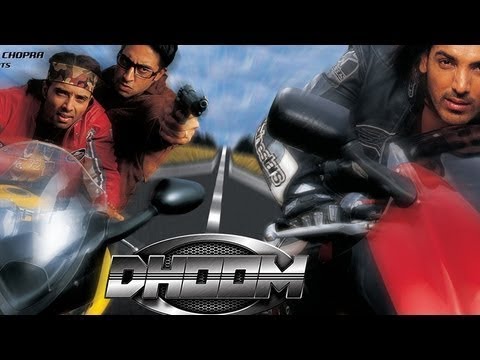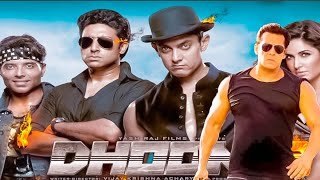Director: Sanjay Gadhvi
Producer: Aditya Chopra (Yash Raj Films)
Writer: Vijay Krishna Acharya
Music: Pritam
Genre: Action Thriller, Heist, Crime, Biker Film
Language: Hindi
Primary Cast:
- John Abraham as Kabir (antagonist)
- Abhishek Bachchan as Jai Dixit (police officer)
- Uday Chopra as Ali (bike mechanic and racer)
- Esha Deol as Sheena
- Rimi Sen as Sweety

🌆 Setting and Cinematic World
The film is set in modern-day Mumbai, a city bursting with speed, neon lights, crowded roads, underground crime, and flashy lifestyle. The vibe is slick, fast, and urban — a huge departure from the traditional Bollywood landscape of family drama or romantic songs in valleys.
Dhoom stylized the city into a racetrack, where speed, danger, rebellion, and thrill are the ruling elements. The bikes aren’t just vehicles; they’re symbols of freedom, power, and escape.
🏍️ Narrative Foundation and Story Structure
The story unfolds around a series of high-profile robberies committed by a motorbike gang that vanishes into thin air after every crime. The gang is led by Kabir, a cold, calculating mastermind who rides a super bike and pulls off robberies with military precision. He and his crew work like a professional heist unit, always one step ahead of the law.
To catch them, ACP Jai Dixit, a no-nonsense police officer, is brought onto the case. Realizing he needs someone who knows the streets and the world of illegal racing, Jai recruits Ali, a local bike mechanic and part-time racer, as his partner.
This sets the stage for a cat-and-mouse chase filled with speed, betrayal, adrenaline, and mind games.
🔍 Character Deep Dive
Kabir (John Abraham)
The charismatic, stylish anti-hero. He is ruthless, brilliant, and obsessed with perfection. Kabir is unlike the typical Bollywood villain — he believes in speed, strategy, and sleek execution. His motives are not personal vendetta or greed alone, but a sort of anarchic thrill, a belief in living life on the edge. His control over his gang is firm, and his exit strategy after each heist is always timed to seconds.
ACP Jai Dixit (Abhishek Bachchan)
Jai is a dedicated, intelligent, and emotionally restrained officer. He doesn’t believe in breaking rules, but the chaos Kabir creates forces him to bend lines. His dry humor and intense dedication contrast with Ali’s comic, free-spirited style.
Ali (Uday Chopra)
Ali is street-smart, talkative, flirtatious, and good-hearted. He provides comic relief but also surprises everyone with his bravery and loyalty. His chemistry with Jai evolves from annoyance to respect. He also represents the common man drawn into a larger world of crime and justice.
Sheena and Sweety
While their roles are minor, they act as emotional touchpoints in the film and reflect the personal sides of the main characters. Sweety is Jai’s wife, showing his vulnerable side, while Sheena is the love interest for Ali, used mostly to reflect his carefree, immature persona.
🔥 Key Plot Points and Turning Moments
- A string of high-tech robberies rocks the city, all done with amazing precision.
- Jai realizes the gang uses superbikes and tight coordination to vanish after each job.
- Jai teams up with Ali to infiltrate the biker community and get close to the robbers.
- Ali earns Kabir’s trust and gets into his gang as a pseudo-member.
- Jai and Ali begin to predict Kabir’s next move and set traps.
- Kabir, however, always seems to be one step ahead, which leads to intense mind games.
- Eventually, Kabir realizes he’s being watched, and turns the game around by setting up Jai and Ali.
- In the final act, there’s a high-speed chase, with betrayals, near-misses, and the ultimate test of who’s smarter.
- Kabir dies in his own preferred way — by driving off a cliff, choosing freedom over arrest. He salutes Jai, a worthy opponent.
🎭 Themes and Underlying Ideas
Speed as Freedom
For Kabir, riding fast isn’t just about escape — it’s about domination, freedom, and living outside the system. His bike is his soul.
Law vs Rebellion
Jai represents the lawful world — methodical, procedural, slow. Kabir represents chaos, anti-establishment energy, and pure adrenaline.
Style and Substance
Dhoom was one of the first Indian films where style itself was a theme — from the way people walked, dressed, rode, and even smirked. It wasn’t just a story, it was a vibe.
Loyalty and Brotherhood
Kabir’s gang isn’t just a team — it’s a brotherhood. Their downfall begins when loyalty cracks. Similarly, Jai and Ali’s partnership is tested and forged under pressure.
🎶 Music and Cultural Impact
Songs like “Dhoom Machale” became cultural phenomena. The soundtrack by Pritam mixed rock, techno, and Bollywood dance rhythms. The title track remains iconic to this day.
The bikes, leather jackets, sunglasses, slick hair, and even the attitude of characters set a new trend for youth in India. Fashion, music videos, and advertising began adopting “Dhoom-style” looks.
🎥 Cinematography and Direction
Director Sanjay Gadhvi delivered a fast-paced narrative with tight editing and stylized visuals. The chase sequences were choreographed like Hollywood action scenes. Bikes were not just props; they were shot like characters, with camera angles emphasizing speed and thrill.
The use of color palettes — dark tones for Kabir, neutral for Jai, and vibrant for Ali — helped highlight character contrasts visually.
🏆 Reception and Legacy
- Dhoom was a massive box office success and redefined action cinema in India.
- It sparked two big sequels: Dhoom 2 (2006) and Dhoom 3 (2013) — each with bigger villains and more daring heists.
- The character of Kabir became a model for stylish, layered antagonists in Bollywood.
- The film helped revive Abhishek Bachchan’s career and brought Uday Chopra into a lasting comedic sidekick role.
🎯 Conclusion: What Makes Dhoom Special?
Dhoom was not just about bikes and robberies. It was about speed versus system, law versus rebellion, loyalty versus betrayal. It didn’t just entertain — it redefined cinematic coolness for Indian youth in the 2000s.
Its biggest achievement? It made being the villain look cooler than being the hero, while still keeping you rooting for justice.

